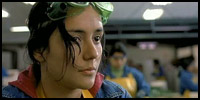
 |
|
Maria Full of Grace (2004) Cast: Catalina Sandino Moreno, Yenny Paolo Vegas, Patricia Rae, Guilied Lopez, Wilson Guerrero, Jhon Alex Toro, Orlando Tobon, Jaime Osorio Gomez 2004 – 101 minutes Rated: Reviewed by Dustin Putman, August 1, 2004.  "Maria Full of Grace" chronicles a particular form of drug transportation that the common U.S. population (myself included, out of being either naive or just plain uninformed) likely is not familiar with—that of human mules, hired to swallow pellets of drugs in order to transfer them across country borders without getting caught. It is a risky business proposition, physically dangerous (if a pellet bursts in your system, the result is lethal) and illegal, but some people see it as a chance worth taking, their only hope of breaking free from poverty.
"Maria Full of Grace" chronicles a particular form of drug transportation that the common U.S. population (myself included, out of being either naive or just plain uninformed) likely is not familiar with—that of human mules, hired to swallow pellets of drugs in order to transfer them across country borders without getting caught. It is a risky business proposition, physically dangerous (if a pellet bursts in your system, the result is lethal) and illegal, but some people see it as a chance worth taking, their only hope of breaking free from poverty.
 Such is the case with 17-year-old Maria (Catalina Sandino Moreno), living in the economically depressed environment of Colombia and working for next to nothing at a flower plantation. With her mother and older sister depending on her paychecks to support them, Maria's mounting desperation only intensifies with two key life events. First, Maria discovers she is pregnant with a baby, the father of whom is an unreliable boyfriend (Wilson Guerrero) she doesn't love. And second, a run-in with her unsympathetic boss at the factory leads her to impulsively quit her job. While on a trip down to Bogota to look for employment, Maria has a chance encounter with Franklin (Jhon Alex Toro), who introduces her to a quick job that could earn her enough money to comfortably support her child and help out her family.
Such is the case with 17-year-old Maria (Catalina Sandino Moreno), living in the economically depressed environment of Colombia and working for next to nothing at a flower plantation. With her mother and older sister depending on her paychecks to support them, Maria's mounting desperation only intensifies with two key life events. First, Maria discovers she is pregnant with a baby, the father of whom is an unreliable boyfriend (Wilson Guerrero) she doesn't love. And second, a run-in with her unsympathetic boss at the factory leads her to impulsively quit her job. While on a trip down to Bogota to look for employment, Maria has a chance encounter with Franklin (Jhon Alex Toro), who introduces her to a quick job that could earn her enough money to comfortably support her child and help out her family.
 Written and directed by New York native Joshua Marston, "Maria Full of Grace" painstakingly accounts the journey of a drug mule from the start of the business agreement to its conclusion (for better or worse). The film is quiet, taking its time to capture every detail just right, but it isn't boring. In fact, watching the experiences of Maria and two other mules—stubborn best friend Blanca (Yenny Paola Vega) and acquaintance Lucy (Guilied Lopez), who yearns to reunite with her estranged sister, Carla (Patricia Rae)—makes for clear-cut, gripping cinema. The viewer is placed right next to Maria as she is first told about this well-paying job she isn't in a position to refuse, and he or she remains with her throughout the difficult process of training herself to swallow 63 individual pellets of heroin, traveling by plane to New York, getting past suspicious custom officers, and facing the matter-of-fact drug collectors. When the pellets are finally passed through one's system, they must be washed thoroughly with toothpaste before going into the loot bag. And if they are passed before said mule has reached their destination, they must be ingested again.
Written and directed by New York native Joshua Marston, "Maria Full of Grace" painstakingly accounts the journey of a drug mule from the start of the business agreement to its conclusion (for better or worse). The film is quiet, taking its time to capture every detail just right, but it isn't boring. In fact, watching the experiences of Maria and two other mules—stubborn best friend Blanca (Yenny Paola Vega) and acquaintance Lucy (Guilied Lopez), who yearns to reunite with her estranged sister, Carla (Patricia Rae)—makes for clear-cut, gripping cinema. The viewer is placed right next to Maria as she is first told about this well-paying job she isn't in a position to refuse, and he or she remains with her throughout the difficult process of training herself to swallow 63 individual pellets of heroin, traveling by plane to New York, getting past suspicious custom officers, and facing the matter-of-fact drug collectors. When the pellets are finally passed through one's system, they must be washed thoroughly with toothpaste before going into the loot bag. And if they are passed before said mule has reached their destination, they must be ingested again.
 Joshua Marston's elucidative screenplay is free of sentimentality and false crises, and his meticulous eye for cold, hard facts on his subject matter raises "Maria Full of Grace" above the level of mere docudrama. By following Maria every step of the way, and not always choosing the easily predicted path, the film garners a felt acuteness without seeming to try. The world Maria is thrust into the second she agrees to become a mule is one that is gritty and uncompromising, filled with authoritative figures breathing down her neck, two drug collectors willing to do whatever necessary to receive their drugs, and a chance of death if one of the pellets leaks in the carrier's stomach.
Joshua Marston's elucidative screenplay is free of sentimentality and false crises, and his meticulous eye for cold, hard facts on his subject matter raises "Maria Full of Grace" above the level of mere docudrama. By following Maria every step of the way, and not always choosing the easily predicted path, the film garners a felt acuteness without seeming to try. The world Maria is thrust into the second she agrees to become a mule is one that is gritty and uncompromising, filled with authoritative figures breathing down her neck, two drug collectors willing to do whatever necessary to receive their drugs, and a chance of death if one of the pellets leaks in the carrier's stomach.
 Everything is at stake for Maria, a protagonist whose unfair lot in life has led her to make one mistake after the next, and she remains a specifically honed, sympathetic figure because the viewer is allowed a look at her life before she becomes a mule. What is seen is unsavory, at best, with family members who use her; a boyfriend who offers her marriage when he finds out she's pregnant, solely out of duty rather than because he loves her; a dead-end, low-paying job at a flower factory; and a home that offers no chance of financial security or positive employment prospects. Because of all this, it is easy to understand where Maria is coming from when she decides to risk her life for a one-shot chance at something more for her future.
Everything is at stake for Maria, a protagonist whose unfair lot in life has led her to make one mistake after the next, and she remains a specifically honed, sympathetic figure because the viewer is allowed a look at her life before she becomes a mule. What is seen is unsavory, at best, with family members who use her; a boyfriend who offers her marriage when he finds out she's pregnant, solely out of duty rather than because he loves her; a dead-end, low-paying job at a flower factory; and a home that offers no chance of financial security or positive employment prospects. Because of all this, it is easy to understand where Maria is coming from when she decides to risk her life for a one-shot chance at something more for her future.
 Newcomer Catalina Sandino Moreno is eye-opening as the put-upon Maria. Moreno is so convincing and believable in her role without even a hint of trying that her performance hardly seems like acting at all—the best kind of work in front of the camera. Yenny Paola Vega and Patricia Rae (2002's "Swimfan") add sturdy support as Maria's friend, Blanca, who chooses to join her as a mule without realizing what she is getting into, and Lucy's compassionate sister, Carla, who takes them in when they have nowhere to go. The casting of Guilied Lopez, as Lucy, however, is problematic. Lopez and Moreno carry such striking physical similarities that at least one scene (set aboard an airplane) is needlessly confusing as to who's who and who's doing what.
Newcomer Catalina Sandino Moreno is eye-opening as the put-upon Maria. Moreno is so convincing and believable in her role without even a hint of trying that her performance hardly seems like acting at all—the best kind of work in front of the camera. Yenny Paola Vega and Patricia Rae (2002's "Swimfan") add sturdy support as Maria's friend, Blanca, who chooses to join her as a mule without realizing what she is getting into, and Lucy's compassionate sister, Carla, who takes them in when they have nowhere to go. The casting of Guilied Lopez, as Lucy, however, is problematic. Lopez and Moreno carry such striking physical similarities that at least one scene (set aboard an airplane) is needlessly confusing as to who's who and who's doing what.
 "Maria Full of Grace" does not feature a strong plot, nor is much accomplished in the space between the opening and ending credits. But, as the study of a mule's job and the travails they must confront on the way toward a big paycheck, the film excels. The drama found within Maria's odyssey toward taking control of her life is unforced and affecting, and there is a wiseness in writer-director Joshua Marston's view of people willing to do whatever is necessary to break free from a life they know they are better than. The last scene, transcendent and powerful without a word of dialogue being spoken, is veritably hopeful in its intentions even as it stays appreciatively open-ended. For Maria, whose life has only just begun, she deserves to be happy, and the decision she makes at the very end is the critical first step at a chance of becoming just that.
"Maria Full of Grace" does not feature a strong plot, nor is much accomplished in the space between the opening and ending credits. But, as the study of a mule's job and the travails they must confront on the way toward a big paycheck, the film excels. The drama found within Maria's odyssey toward taking control of her life is unforced and affecting, and there is a wiseness in writer-director Joshua Marston's view of people willing to do whatever is necessary to break free from a life they know they are better than. The last scene, transcendent and powerful without a word of dialogue being spoken, is veritably hopeful in its intentions even as it stays appreciatively open-ended. For Maria, whose life has only just begun, she deserves to be happy, and the decision she makes at the very end is the critical first step at a chance of becoming just that.
|
© 2004 by Dustin Putman |














